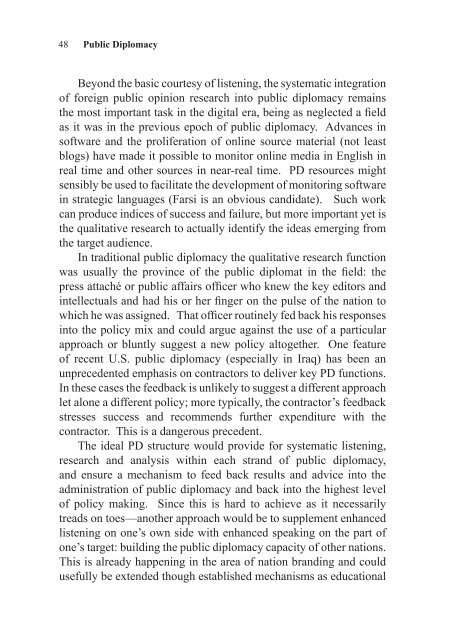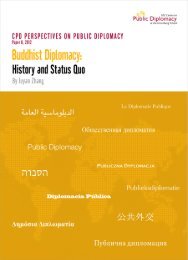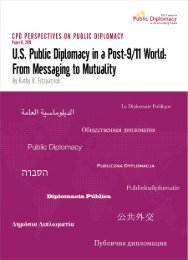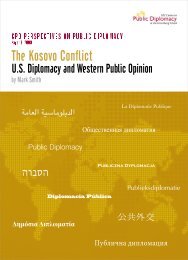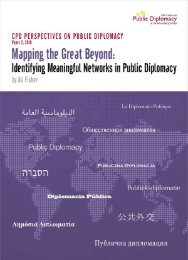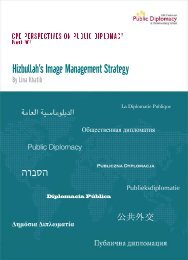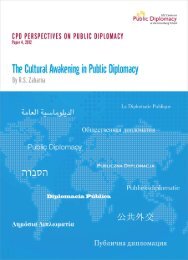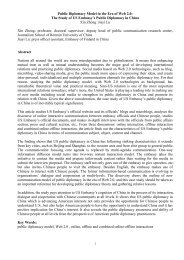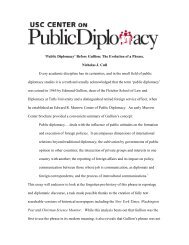Lessons from the Past - USC Center on Public Diplomacy
Lessons from the Past - USC Center on Public Diplomacy
Lessons from the Past - USC Center on Public Diplomacy
Create successful ePaper yourself
Turn your PDF publications into a flip-book with our unique Google optimized e-Paper software.
48 <strong>Public</strong> <strong>Diplomacy</strong><br />
Bey<strong>on</strong>d <str<strong>on</strong>g>the</str<strong>on</strong>g> basic courtesy of listening, <str<strong>on</strong>g>the</str<strong>on</strong>g> systematic integrati<strong>on</strong><br />
of foreign public opini<strong>on</strong> research into public diplomacy remains<br />
<str<strong>on</strong>g>the</str<strong>on</strong>g> most important task in <str<strong>on</strong>g>the</str<strong>on</strong>g> digital era, being as neglected a field<br />
as it was in <str<strong>on</strong>g>the</str<strong>on</strong>g> previous epoch of public diplomacy. Advances in<br />
software and <str<strong>on</strong>g>the</str<strong>on</strong>g> proliferati<strong>on</strong> of <strong>on</strong>line source material (not least<br />
blogs) have made it possible to m<strong>on</strong>itor <strong>on</strong>line media in English in<br />
real time and o<str<strong>on</strong>g>the</str<strong>on</strong>g>r sources in near-real time. PD resources might<br />
sensibly be used to facilitate <str<strong>on</strong>g>the</str<strong>on</strong>g> development of m<strong>on</strong>itoring software<br />
in strategic languages (Farsi is an obvious candidate). Such work<br />
can produce indices of success and failure, but more important yet is<br />
<str<strong>on</strong>g>the</str<strong>on</strong>g> qualitative research to actually identify <str<strong>on</strong>g>the</str<strong>on</strong>g> ideas emerging <str<strong>on</strong>g>from</str<strong>on</strong>g><br />
<str<strong>on</strong>g>the</str<strong>on</strong>g> target audience.<br />
In traditi<strong>on</strong>al public diplomacy <str<strong>on</strong>g>the</str<strong>on</strong>g> qualitative research functi<strong>on</strong><br />
was usually <str<strong>on</strong>g>the</str<strong>on</strong>g> province of <str<strong>on</strong>g>the</str<strong>on</strong>g> public diplomat in <str<strong>on</strong>g>the</str<strong>on</strong>g> field: <str<strong>on</strong>g>the</str<strong>on</strong>g><br />
press attaché or public affairs officer who knew <str<strong>on</strong>g>the</str<strong>on</strong>g> key editors and<br />
intellectuals and had his or her finger <strong>on</strong> <str<strong>on</strong>g>the</str<strong>on</strong>g> pulse of <str<strong>on</strong>g>the</str<strong>on</strong>g> nati<strong>on</strong> to<br />
which he was assigned. That officer routinely fed back his resp<strong>on</strong>ses<br />
into <str<strong>on</strong>g>the</str<strong>on</strong>g> policy mix and could argue against <str<strong>on</strong>g>the</str<strong>on</strong>g> use of a particular<br />
approach or bluntly suggest a new policy altoge<str<strong>on</strong>g>the</str<strong>on</strong>g>r. One feature<br />
of recent U.S. public diplomacy (especially in Iraq) has been an<br />
unprecedented emphasis <strong>on</strong> c<strong>on</strong>tractors to deliver key PD functi<strong>on</strong>s.<br />
In <str<strong>on</strong>g>the</str<strong>on</strong>g>se cases <str<strong>on</strong>g>the</str<strong>on</strong>g> feedback is unlikely to suggest a different approach<br />
let al<strong>on</strong>e a different policy; more typically, <str<strong>on</strong>g>the</str<strong>on</strong>g> c<strong>on</strong>tractor’s feedback<br />
stresses success and recommends fur<str<strong>on</strong>g>the</str<strong>on</strong>g>r expenditure with <str<strong>on</strong>g>the</str<strong>on</strong>g><br />
c<strong>on</strong>tractor. This is a dangerous precedent.<br />
The ideal PD structure would provide for systematic listening,<br />
research and analysis within each strand of public diplomacy,<br />
and ensure a mechanism to feed back results and advice into <str<strong>on</strong>g>the</str<strong>on</strong>g><br />
administrati<strong>on</strong> of public diplomacy and back into <str<strong>on</strong>g>the</str<strong>on</strong>g> highest level<br />
of policy making. Since this is hard to achieve as it necessarily<br />
treads <strong>on</strong> toes—ano<str<strong>on</strong>g>the</str<strong>on</strong>g>r approach would be to supplement enhanced<br />
listening <strong>on</strong> <strong>on</strong>e’s own side with enhanced speaking <strong>on</strong> <str<strong>on</strong>g>the</str<strong>on</strong>g> part of<br />
<strong>on</strong>e’s target: building <str<strong>on</strong>g>the</str<strong>on</strong>g> public diplomacy capacity of o<str<strong>on</strong>g>the</str<strong>on</strong>g>r nati<strong>on</strong>s.<br />
This is already happening in <str<strong>on</strong>g>the</str<strong>on</strong>g> area of nati<strong>on</strong> branding and could<br />
usefully be extended though established mechanisms as educati<strong>on</strong>al


